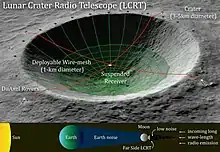Lunar Crater Radio Telescope
The Lunar Crater Radio Telescope (LCRT) is a proposal by the NASA Institute for Advanced Concepts to create an ultra-long-wavelength (that is, wavelengths greater than 10 m, corresponding to frequencies below 30 MHz) radio telescope inside a lunar crater on the far side of the Moon.[1][lower-alpha 1]
 | |
| Alternative names | LCRT |
|---|---|
| Location(s) | far side of the Moon |
| Telescope style | radio telescope |
| Diameter | 350 m (1,148 ft 4 in) |

If completed, the telescope would have a structural diameter of 1.3 km, and the reflector would be 350m in diameter.[3][4][5] Robotic lift wires and an anchoring system would enable origami deployment of the parabolic reflector.[6]
History
A previous proposal put the proposed relector size at 1 km diameter.[7] As of 2023, work on the lunar crater radio telescope is ongoing at Caltech/NASA Jet Propulsion Laboratory.[2]
Construction
To be sensitive to long radio wavelengths, the LCRT would need to be huge. The idea is to create an antenna over half-a-mile (1 kilometer) wide in a crater over 2 miles (3 kilometers) wide. The biggest single-dish radio telescopes on Earth – like the 1,600-foot (500-meter) Five-hundred-meter Aperture Spherical Telescope (FAST) in China and the now-inoperative 1,000-foot-wide (305-meter-wide) Arecibo Observatory in Puerto Rico – were built inside natural bowl-like depressions in the landscape to provide a support structure.[2]
This class of radio telescope uses thousands of reflecting panels suspended inside the depression to make the entire dish’s surface reflective to radio waves. The receiver then hangs via a system of cables at a focal point over the dish, anchored by towers at the dish’s perimeter, to measure the radio waves bouncing off the curved surface below. But despite its size and complexity, even FAST is not sensitive to radio wavelengths longer than about 14 feet (4.3 meters).[2]
The LCRT concept eliminates the need to transport prohibitively heavy material to the Moon and utilizes robots to automate the construction process. Instead of using thousands of reflective panels to focus incoming radio waves, the LCRT would be made of thin wire mesh in the center of the crater. One spacecraft would deliver the mesh, and a separate lander would deposit DuAxel rovers to build the dish over several days or weeks.[2]
DuAxel, a robotic concept being developed at JPL, is composed of two single-axle rovers (called Axel) that can undock from each other but stay connected via a tether. One half would act as an anchor at the rim of the crater as the other rappels down to do the building.[2][8]
Another concept, that reduces both cost and complexity by almost half, is using a Lift Wire Deployment and Anchoring System for LCRT, as shown in picture.

Notes
- Radio telescopes on Earth can't probe the long-wavelength radio waves from the universe's Dark Ages, as the ionosphere reflect them through its layer of ions and electrons.[2]
References
- Bandyopadhyay, Saptarshi; Mcgarey, Patrick; Goel, Ashish; Rafizadeh, Ramin; Delapierre, Melanie; Arya, Manan; Lazio, Joseph; Goldsmith, Paul; Chahat, Nacer; Stoica, Adrian; Quadrelli, Marco; Nesnas, Issa; Jenks, Kenneth; Hallinan, Gregg (March 2021). "Conceptual Design of the Lunar Crater Radio Telescope (LCRT) on the Far Side of the Moon". 2021 IEEE Aerospace Conference (50100). pp. 1–25. doi:10.1109/AERO50100.2021.9438165. ISBN 978-1-7281-7436-5. S2CID 235383869.
- O'Neill, Ian J.; Skelly, Clare (5 May 2021). "Lunar Crater Radio Telescope: Illuminating the Cosmic Dark Ages". NASA. Retrieved 6 May 2021.
 This article incorporates text from this source, which is in the public domain.
This article incorporates text from this source, which is in the public domain. - Wang, Rebecca; Gehlot, Vinod P.; Bandyopadhyay, Saptarshi; McGarey, Patrick M.; Byron, Benjamin; Pisanti, Dario; Wilson, Ron; Jenks, Kenneth (23 January 2023). "Lift Wire Deployment and Anchoring System for the Lunar Crater Radio Telescope on the Far Side of the Moon". AIAA SCITECH 2023 Forum. American Institute of Aeronautics and Astronautics. doi:10.2514/6.2023-1787. ISBN 978-1-62410-699-6. S2CID 256134317.
- Lunar Crater Radio Telescope (LCRT) on the Far-Side of the Moon - NASA NIAC Symposium 2022, retrieved 2023-02-08
- McGarey, Patrick; Bandyopadhyay, Saptarshi; Rafizadeh, Ramin; Goel, Ashish; Arya, Manan; Nesnas, Issa; Lazio, Joe; Goldsmith, Paul; Stoica, Adrian; Quadrelli, Marco; Hallinan, Greg (19 October 2020). "A Concept for the Deployment of a Large Lunar Crater Radio Telescope Using Teams of Tethered Robots". Root.
- Arya, Manan; Herrscher, Jt; Pisanti, Dario; Verniani, Alessandro; Delapierre, Melanie; Gupta, Gaurangi; Goel, Ashish; Lazio, Joseph; Goldsmith, Paul; Bandyopadhyay, Saptarshi (23 January 2023). "Kilometer-Scale Parabolic Reflector for a Radio Telescope in a Lunar Crater". AIAA SCITECH 2023 Forum. American Institute of Aeronautics and Astronautics. doi:10.2514/6.2023-0754. ISBN 978-1-62410-699-6. S2CID 256154670.
- Gupta, Gaurangi; Arya, Manan; Goel, Ashish; Bandyopadhyay, Saptarshi; Goldsmith, Paul; Mcgarey, Patrick; Lazio, Joe; Chahat, Nacer (June 2022). "Detector Development for the Lunar Crater Radio Telescope". 2022 IEEE Wireless Antenna and Microwave Symposium (WAMS). pp. 1–5. doi:10.1109/WAMS54719.2022.9847712. ISBN 978-1-6654-5846-7. S2CID 251762929.
- "A Concept for the Deployment of a Large Lunar Crater Radio Telescope Using Teams of Tethered Robots". 8 February 2022.
- "A Concept for the Deployment of a Large Lunar Crater Radio Telescope Using Teams of Tethered Robots". JPL Open Repository. 8 Feb 2022.
 This article incorporates text from this source, which is in the public domain.
This article incorporates text from this source, which is in the public domain.
Bibliography
- Bandyopadhyay, Saptarshi (2020-09-30). "Lunar Crater Radio Telescope (LCRT) on the Far-Side of the Moon". YouTube.